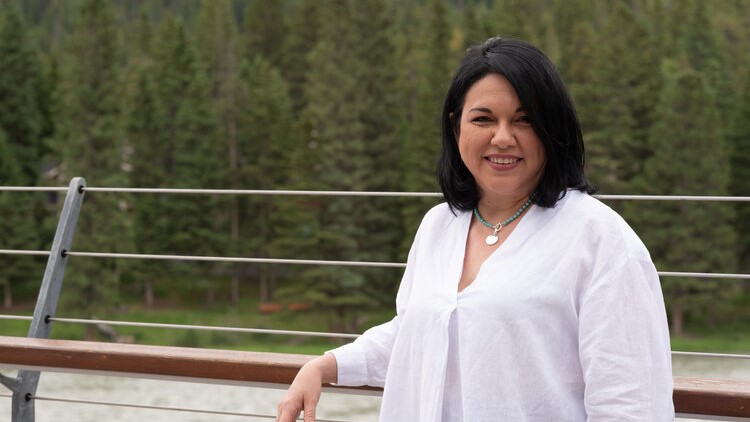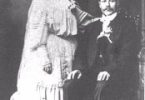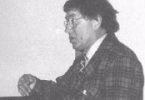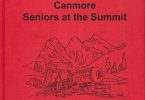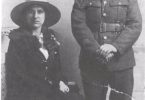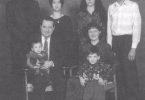How long have you been in the Bow Valley?
“I moved to Canada in 2014. Back in Mexico, I worked on the cutting-edge technology field, specifically robotics for the automotive industry. I spent my first two years in Canada as a full-time student at the school of Hospitality and Tourism at SAIT Polytechnic in Calgary. In 2016, one month before graduation, I was offered a job at a hotel in Banff and I did not think it twice. I thought it would be a dream to live in such a beautiful location and I’ve been here since then!”
What does an average day look like for you right now?
“Right now, every day is so out of the normal because days are not regular days anymore and, at the same time, every day seems the same. Being on leave from works has placed me in a situation where we must use our creativity to stay active and find meaning in the seemingly dullness of the new normal.
Personally, I try to create my day by being in nature as much as possible to practice self care. And then my activities in the community. I am involved with the Banff Food Rescue.
These are challenging times for the whole community, so I have found meaning by being part of a team that secures food for people and that is a great source of inspiration for me.
I also find meaning and inspiration by going inwards, and by connecting with friends and family both in Canada and in Mexico, I try to check in with them as often as possible from a distance, using the amazing tools we have nowadays, which keep us connected and close. I try to remain strong and healthy and to motivate my friends and loved ones to do so as well.”
How are you getting along with your close relationships?
“It has changed of course because these times have made us turn to what is essential. There are so many things that were not essential, and are not even available anymore, so we are turning to each other. It has been the silver lining inside this situation, that it has made me value more my relationships. One simple question ‘how are you doing today?’ makes a difference in someone’s day or someone’s life right now. Little things for others, even smiling to strangers when you walk around town. Being kind, promoting kindness, promoting kindness in the community.
That is the way I think we should take care of each other, even if we know each other or we don’t. Smile at each other at the supermarket, it is free so just give it away!”
Has this impacted your financial situation?.
“My financial situation was indeed impacted. I found a new job in hospitality back in March this year and my hiring process was interrupted due to the pandemic, since the hospitality industry had to temporarily close operations. My hiring process was resumed in late July, then I had to apply for a work permit that was approved until November. I was happy to finally start working after so many months being unemployed. Unfortunately, though, I had the opportunity to only work normally for one week, then after that, there was rising cases in the areas, so from a regular 5-day week, my scheduled hours had to be reduced in more than 50 percent and that, added to the months I spent unemployed did impact my finances. However, the way the Canadian system has been able to respond to this emergency with economic relief for citizens, residents and foreign workers has been impressive. You can see your taxes working and feel supported in these difficult times, and that is something that unfortunately many other countries lack. I feel lucky to live in a country with a supportive system.”
What’s been the hardest part of this year for you?
“The hardest thing during the pandemic has been the restriction of human interactions. It has been so drastically modified that it has impacted our mental health. The paradoxical fact that we must socially distance from one another in times when it is crucial to stay close to our support networks. For people like myself, an immigrant in Canada, it has been a true trial not to be able to travel to our homeland and miss important family events, like the birth of my youngest niece for example, and other occasions like funerals, weddings, Christmas and so forth.”
Is there anything you are afraid of?
“The first thing I was afraid of was the fate of my permanent residency application, which was put at risk because I was not able to keep my employment. As I described before, I became unemployed for the most part of 2020, so it was certainly a stressful situation I found myself under. So many immigrants like me have undergone the same trial, and a few people I know, were not able to salvage their immigration process and sadly had to leave Canada. However, IRCC has applied great efforts to be flexible and to adapt to the challenges that this pandemic has laid upon immigrants, refugees and foreign workers and that is something I hugely appreciate.
Secondly, I am afraid of my own fate since these times have proven to be highly unpredictable.
Nothing can be taken for granted anymore. Uncertainty has been the constant during these times and, of course, I am afraid of the fate of my loved ones in my homeland, who have been exposed to even tougher circumstances.”
What do you think you will remember from this time?
“I will certainly remember the remarkable sense of community coming strong in the Bow Valley. From the Town of Banff, to support organizations like the YWCA as well as other groups and charities, and the community in general, neighbours and friends who came together and worked as a team to help each other. The way people assisted individuals in isolation, volunteering to bring food, and helping with errands. This was something that could only come up under a situation like this. It was a beautiful sight to behold.
Secondly, and a big lesson for me, at a personal level, it was to see how we turned our eyes to what is essential. So many doors were closed in town and that made us turn into what we need the most: connection and nature. People started gathering close to nature, by the river, under the sun. We, maybe at an unconscious level, began to “understand”.”
If you could speak directly to somebody in the past or the future, what would you say to them?
“I have said that a couple of times, multiple times lately: stay strong. Defend your health, your mental integrity, be kind to others and to yourself. Whatever happens, if you are strong inside, you can success and endure.”
Anything else?
“The lesson I learned from nature during these times and during the first lockdown was remarkable. If you turn to nature – the mountains, the animals – they thrive – they are oblivious to our human drama. If we just do what we are supposed to do as humans, we can thrive. We should turn inside to see what we are really supposed to do as humans, just like animals. They just do what they do and teach us without preaching. They just are. That was the big lesson for me. They do know what it essential, and they act accordingly.
One day I remember clearly, I was sitting on a bench here by the river, thinking about my future, my finances. I was unemployed -What will happen to me I thought? My immigration process, my life in general…
Then, I saw a falcon just flying around. I was looking at the falcon, then it just landed, spotted something on the ground, grabbed it with its claws, and then took off. It took a squirrel; it was hunting a squirrel and I could see the squirrel fly away. There was so much beauty! I was thinking about my personal drama. In the meantime, nature keeps going, doing what they were created to do. Some people might say its such a cruel sight, but it is just what it is. The squirrel for example, that’s the circle of life, and they flow with it, but we humans are still struggling with this and that, stores are closed… how small our struggles are if we compare them with the big scheme of life, the big picture. I just had to look at them. It was very humbling, a big lesson from apparently small creatures!
What I love the most is that I have been studying the Indigenous heritage of Canada. The indigenous people base their culture on oral traditions. If we are aware as a community that we are starting to tell stories to heal… We are going back to the origin and that to me is beautiful, and powerful. Maybe some of us are not aware that the oral traditions are the soul of the first peoples – medicine, relations, politics.
We are so eager to tell and to hear stories, so there must be a link between us and the ones who dwelled in these lands before us.
The Stories of Resilience project offers deeply personal insights into the lives of Bow Valley residents during the COVID-19 pandemic. They each share their unique challenges, fears, hopes, and lessons learnt during this unique time in history. This project was brought to life by a collaboration of local organizations: Bow Valley Immigration Partnership (BVIP), artsPlace Canmore, Kristy Wolfe Photography, Canmore Museum. With special thanks to Community Connections in the Bow Valley.
Explore More Stories of Resilience
